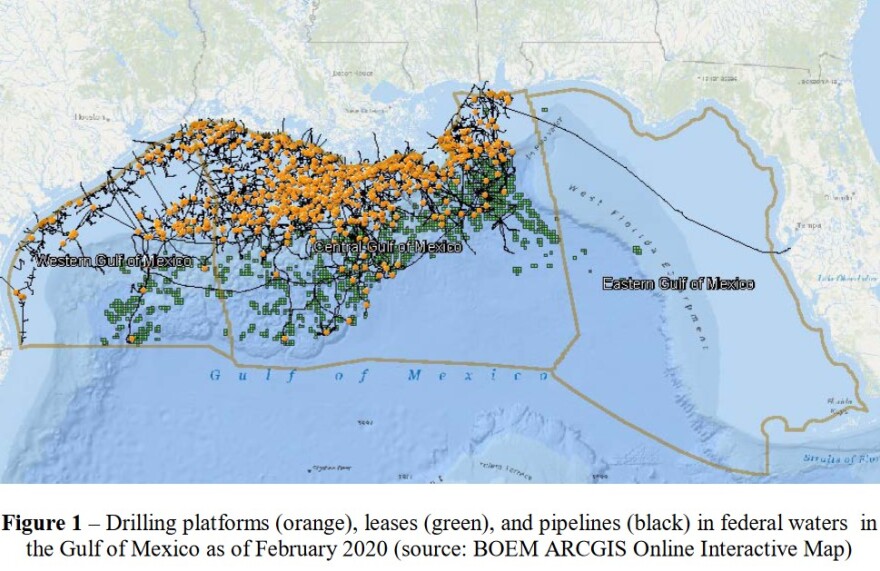Several environmental groups have filed a lawsuit against the federal government's planned sale of 80 million acres of the Gulf for oil and gas drilling leases.
They claim the sale would violate one of the nation's bedrock environmental laws. The lawsuit claims that the Department of the Interior's Bureau of Ocean Energy Management's sale of leases in 80 million acres of the Gulf on Dec. 10 bypasses the National Environmental Policy Act.
That law requires federal agencies to look at the possible environmental effects before any action can be taken.
Martha Collins of St. Petersburg is executive director of Healthy Gulf, one of the plaintiffs. She said that failing to look at what could possibly happen from selling public waters could expose much of the Gulf to oil spills and harm the endangered Rice's whale.
"The Gulf is just such its own unique body of water. It's one of the most biodiverse areas on the planet. It has many endangered species, let alone all of the communities across the Gulf from Texas, Louisiana, Mississippi, Alabama and Florida that derive their livelihoods from a healthy Gulf of Mexico," Collins said.
"So you're talking about the fishing industries, the tourism industries. So, to not look at any of the impacts of a massive lease sale on the local communities, the resources that they're dependent upon, let alone the species themselves, is just an abhorrent violation of the law."
The plaintiffs include Earthjustice, Friends of the Earth, Center for Biological Diversity, Natural Resources Defense Council and Sierra Club.
READ MORE: Save the Amazon or drill for oil? Brazil says it can do both
They claim that failing to look at what could possibly happen from selling public waters could expose much of the Gulf to oil spills and harm the endangered Rice's whale.
"Opening 80 million acres in the Gulf is a recipe for more spills, more carbon pollution and more damage to coastal communities and marine life," said Irene Gutierrez, senior attorney with Natural Resources Defense Council. "This sale is proceeding without basic environmental review and has the weakest safeguards we've seen in years, and is a step backward on climate, clean energy and a livable future."

"Once again, the Trump administration is ignoring the law so it can sell off our public lands and waters," said Devorah Ancel, senior attorney with Sierra Club's Environmental Law Program. "Offshore drilling has devastating consequences for coastal ecosystems, wildlife and communities, and with this lease sale, the Trump administration has designed one of the riskiest, dirtiest and most ethically questionable sales in recent memory. We're taking them to court – again – because no administration gets to pick and choose which laws it follows and which it flouts."
On Thursday, the Interior Department announced a second sale of 80 million acres of the Gulf, set for March. The sales stop east of the Florida-Alabama line.
On its website, the department said: "This sale is the second of thirty Gulf of America oil and gas lease sales required by the One Big Beautiful Bill Act. By committing to a predictable sale schedule, the Department is delivering on President Trump's promise to expand American energy production and strengthen U.S. energy dominance."
According to the department, the sale proposes to offer about 15,000 unleased blocks covering about 80 million acres on the U.S. Outer Continental Shelf. The blocks are located 3 to 231 miles offshore and span water depths from 9 to more than 11,100 feet.
This month, a bill was filed in Congress by Florida's two U.S. senators that would continue a ban on oil and gas drilling off the coasts of Florida, Georgia and South Carolina.
Collins, of Healthy Gulf, said the danger to Florida's beaches and tourism industry from another oil spill like the 2010 BP spill is real.
"Tourism is Florida's number one economy, and the BP oil spill was not that long ago. And while the BP oil spill wasn't directly in what's considered the eastern Gulf of Mexico, we still had oil wash up on the Panhandle shores," she said.
She added that because there was such a large oil spill in the Gulf, there was a perception that all of Florida's beaches were affected.
"So even here in the Tampa Bay area, even though we didn't have oil wash up on our shores, the perception was that oil was still impacting our area, because people were seeing images of oil on Florida's beaches," Collins said. "So it just has a huge psychological impact on people that still live in this area. We want our beaches. We want our waters protected. But tourism is our No. 1 economy."
Copyright 2025 WUSF 89.7






